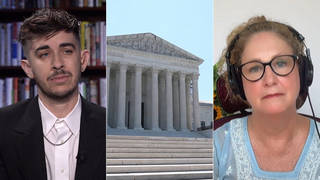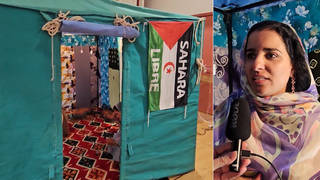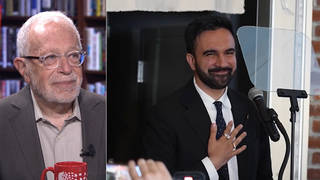
A Pentagon-commissioned report concludes the effects of climate change over the next 20 years could result in global catastrophe that leads to millions of deaths from war and natural disasters. [includes transcript]
The document outlines a worst-case, but plausible scenario in which abrupt climate change brings the planet to the edge of anarchy as countries develop a nuclear threat to defend dwindling food, water and energy supplies. The report concludes, “Disruption and conflict will be endemic features of life” and the report’s authors say climate change “should be elevated beyond a scientific debate to a US national security concern.”
- Paul Harris, U.S. correspondent for the London Observer who reported on this story over the weekend.
Transcript
AMY GOODMAN: I wanted to turn to the issue of global warming. A pentagon commissioned report concludes the effects of climate change in the next 20 years could result in global catastrophe that leads to millions of deaths from war and natural disasters. But we haven’t seen much evidence of this report. Paul Harris is the U.S. correspondent for the London Observer who reported on this over the weekend. He joins us as well in our firehouse studio. Welcome to Democracy Now! Paul.
PAUL HARRIS: Thank you.
AMY GOODMAN: Can you talk about this report?
PAUL HARRIS: Yes. Sure. Basically this report was commissioned by the Pentagon as part of, a sort of look at national security and, they went and talked to scientists off the record so that researchers felt that scientists would perhaps be more forthcoming, in a way, if they didn’t have to be public. The report was drawn up as a scenario that basically looked at what could happen if trends continued, and conclusions they came up with were frightening.
They are talking about massive flooding, about mega droughts affecting large parts of the world, causing famine and hunger for millions, increasing conflicts over water and parts of the world, like Europe and America, becoming fortress states in a world that is marked by conflict around issues like resources, food, water, rather than issues of national sovereignty or terrorism that we are used to at moment. They stress that this is just one scenario.
But the fact that they’re coming up with this report shows thinking within the Pentagon that you wouldn’t really guess from looking at the administration, which does tend to go into denial on the issue of climate change. But this report, which should have been published, but hasn’t been published yet by the pentagon, does show there are significant divergences behind the closed walls in the Pentagon on the administration’s thinking.
AMY GOODMAN: Explain why nuclear war would result, at least according to the Pentagon report?
PAUL HARRIS: Because basically the competition for resources becomes so intense that states literally start having to fight for their survival. One scenario, the report looks at the possibility that South and North Korea could ban together in terms of surviving in the difficult environment. North Korea would bring nuclear weapons, and South Korea would bring it a more stable political and economic system. I don’t know if anyone would like to see a unified Korean state in a world where the war is endemic. You could look at the conflict between India and Pakistan, which are two nuclear powers, and resource competition becomes intense, you could have nuclear war there.
AMY GOODMAN: So this is a report that was commissioned by the Pentagon?
PAUL HARRIS: It was commissioned by the Pentagon to look at the national security implications of this report. It’s not meant to be classified, but the pentagon so far has refused to release it, but it has.
AMY GOODMAN: Who in the pentagon commissioned it?
PAUL HARRIS: It was commissioned by Andrew Marshall, who is an extremely respected military strategist, who has sort of commanded great respect in the pentagon for 30 years. And he commissioned it to look at the national security implications of climate change. It’s not specifically looking at the science of it. It’s the national security implications, which perhaps might explain why it hasn’t been released as yet.
AMY GOODMAN: In your report, you also took about British scientists coming to the White House. Who did they meet with, what did they say?
PAUL HARRIS: They met with various officials from the American scientists who have expressed their belief that the administration is not really doing enough on climate change, that their opinions are sort of far outside what is sort of generally seen as the scientific standard that climate change is an issue that needs addressing. Looking at this pentagon report, it’s clear there are large parties that think that the climate change should be addressed, but you would not know that from looking at the pronouncements from the White House.
AMY GOODMAN: You write in the observer that sources said that American officials appeared extremely sensitive about the issue, when faced with complaints that America’s public stance appeared increasingly out of touch. One even alleged that the White House had written to complain about the comments attributed to professor Sir David King, Tony Blair’s chief scientific adviser, after he branded the president’s position on the issue as indefensible.
PAUL HARRIS: I think that shows the clear difference between this administration and increasingly large amounts of not only the scientific population, but other governments worldwide. This administration when it comes to climate change is out on its own in terms of being almost in a state of denial. Whereas, the scientific bodies and governments just really think this is an issue we need to tackle.
AMY GOODMAN: This is Democracy Now! We’ll continue this discussion about science and the White House in a minute.













Media Options